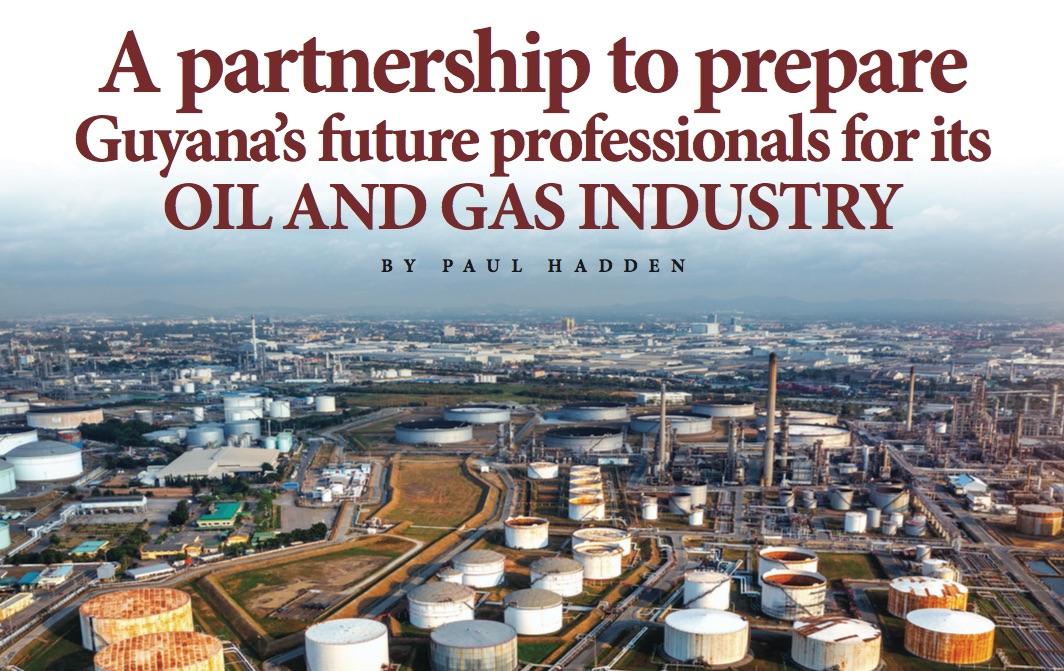
In May of 2015, significant amounts of oil were discovered off the coast of Guyana. The latest estimates show over 11 billion barrels of oil now in the nation's reserves. As impressive as these numbers are, Guyana is still only in the first quartile of its exploration phase, and is expected to exceed a production of over 350,000 barrels of oil per day by the year 2030.
With a population of just under 800,000, Guyana is reported to have the 17th largest oil reserves in the world and one of the world's fastest growing economies. However, a discovery of this magnitude also has its challenges. One of the most significant has been finding a way to train its citizens for this new and lucrative industry.
To bridge this knowledge gap, UWI St Augustine, the University of Trinidad and Tobago (UTT), and the University of Guyana (UG) embarked on a project to give Guyanese students the training for the country’s budding oil and gas industry. Two programmes were created: an Associate of Science Degree in Petroleum Engineering offered by UG in collaboration with UTT and a Master of Science Degree in Petroleum Engineering offered by the UWI in collaboration with UG.
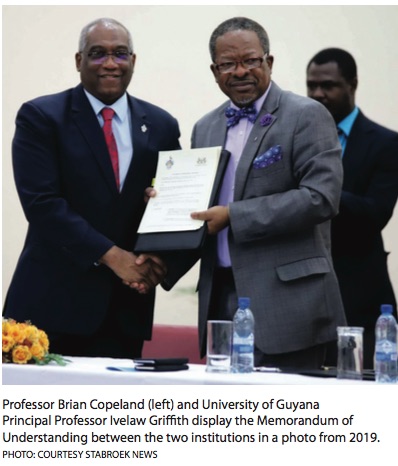
“When the commercial oil discovery was made in 2015, a team of us that included then Principal of The UWI Clement Sankat, travelled to Guyana to meet with the Guyanese Prime Minister and representatives from the Guyanese Ministry of Natural Resources, Ministry of Education and University of Guyana to discuss the potential role that The UWI could play in this discovery,” says Professor Andrew Jupiter, a key player in T&T’s energy sector and the Coordinator of the Petroleum Studies Unit.
Prof Jupiter says that “it was decided that The UWI should play a pivotal role in education because we have a well-established programme in Petroleum Engineering. We are able to provide the technical expertise needed by the Guyanese students”.
The project was spearheaded by Professor Jupiter and Professor Raffie Hosein, Head of the Department of Chemical Engineering. The first steps towards the offering of the master’s programme began not long after the initial discovery, when Professor Jupiter and a team went to Guyana to discuss the potential role The UWI could play in education towards the development of the oil and gas industry.
After further talks in Guyana, and a visit of the Guyanese contingent to Trinidad to meet with the lecturers and tour the facilities at the St Augustine Campus, it was agreed that the Master's in Petroleum Engineering would be delivered through The UWI in partnership with UG. UG would provide accommodation for the students while the lectures would be given by the academic staff from UWI St Augustine.
An agreement was signed between Campus Principal Professor Brian Copeland and Principal of UG Professor Ivelaw Lloyd Griffith, on January 25, 2019. The programme officially commenced on August 31, 2019, with special preparatory classes being held in-person at the Turkeyen campus in Guyana before the start of the semester.
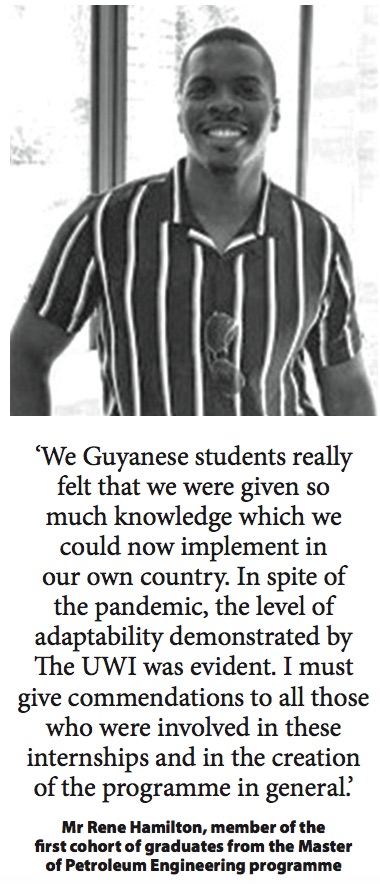
“I wanted the programme to begin on [T&T] Independence Day so that it would be a really memorable day for us,” says Professor Hosein, who was the programme's first official lecturer. “We had ten students who had registered for the programme, eight of whom were on scholarships through the Guyanese government. The plan was to provide the students with an intensive week of in-person classes before the semester began to help them gain a solid foundation in the course material.”
After these face-to-face classes, Professor Hosein and his colleagues returned to Trinidad to begin lectures at the St Augustine Campus. The Guyanese students joined the classes virtually. Many of these lectures had already been given in-person in Guyana, but it was decided that a second time would give the students a better appreciation and knowledge for the demanding petroleum engineering courses.
“We wanted to offer the Guyanese students as much help as we could,” adds Professor Hosein, “so we tried our best to find out what challenges they may be facing, and to give them extra tutorials so that they would feel comfortable with the course material.”
The face-to-face classes were also a way for the Guyanese students to form relationships with their Trinidadian professors and lecturers.
“Because we had already met the professors in person, it was easy for us to feel like we were part of the class when it switched to online,” says Mr Rene Hamilton, who was part of the first cohort of Guyanese students to graduate from the collaborative programme in 2021.
“In many ways,” he adds, “it felt like we had studied the great majority of the course before the course began and this gave us a great platform to get a jumpstart. My perspective as a Guyanese student was different to the Trinidadian students who have been exposed to the oil and gas industry early on. For us, this was all very new, so it was a huge learning curve. The in-person training made a world of difference and gave us a really good start.”
The initial plan was to continue this pattern of pre-semester in-person classes. Then came the pandemic.
“COVID changed everything and forced us to be more creative,” says Professor Jupiter. “It especially posed a challenge to the internship that the students had to complete for their degree.”

To facilitate the internship, The UWI signed a MoU with the National Energy Corporation in March 2020 to work with the NGC Group of Companies, who gave the students the opportunity to work on the project of designing a pipeline to transfer natural gas from offshore to onshore Guyana.
“The internship posed a great problem at first as we had planned to have it in-person at an oil and gas company,” says Rene, “but I think that The UWI was flexible and able to quickly adjust to the new situation. We were given a very practical and relevant project to work on, and the knowledge that we received from the many technical experts at NGC made for a very rich experience.”
A second internship was organised through the Ministry of Energy and Energy Industries of Trinidad and Tobago, fully supported by the Permanent Secretary, Mrs Penelope Bradshaw-Niles.
“As if one internship was not good enough,” says Rene, “we were then given a second internship through which we looked at the regulatory structure of the oil and gas industry from Trinidad's perspective.”
This internship included training on aspects of evaluating, monitoring, controlling, and auditing oil and gas operations.
“We even got to meet the Minister of Energy and Energy Industries, Minister Stuart Young, as well as many other distinguished and knowledgeable persons who have had a lot of experience in the industry,” says Rene.
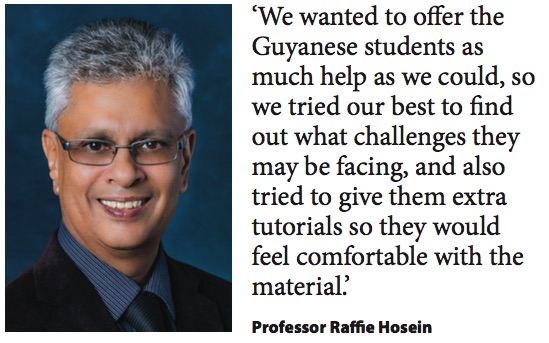
“We Guyanese students really felt that we were given so much knowledge which we could now implement in our own country,” he explains. “In spite of the pandemic, the level of adaptability demonstrated by The UWI was evident. I must give commendations to all those who were involved in these internships and in the creation of the programme in general.”
Another graduate of the programme, Mr Ramish Baichoo, had similar sentiments: “In spite of the challenges of the first year and then the difficulties that the pandemic presented, it was really a very well-put together course. Getting information from experienced people in the industry was extremely helpful to us who are completely new to the industry. Of course, the course was challenging in terms of the content, but it was a very good experience over all.”
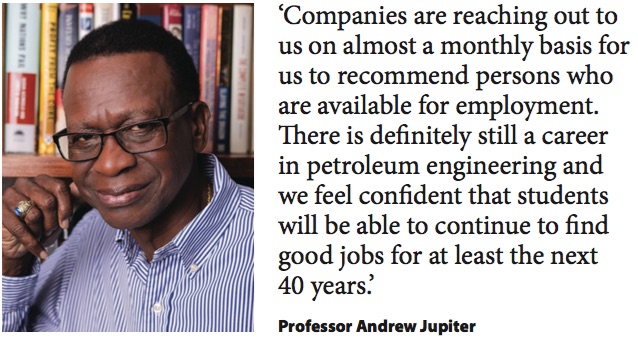
The programme, now in its third year, continues to develop and adjust to the Guyanese oil and gas landscape. Even as the world starts turning more and more towards renewable energy sources, both Professors Jupiter and Hosein are confident that the industry will continue to hire petroleum engineers whose knowledge and skillset will be needed for the energy transition.
“Companies are reaching out to us on almost a monthly basis for us to recommend persons who are available for employment,” says Professor Jupiter, “There is definitely still a career in petroleum engineering and we feel confident that students will be able to continue to find good jobs for at least the next 40 years.”
He adds, “I also want to stress that I believe there should be continued collaboration between Guyana and Trinidad and Tobago as Guyana’s industry develops. Guyana is already successful, but we would love to see further collaboration with Guyana and Trinidad and Tobago in all aspects of the service industry in the petroleum sector.”